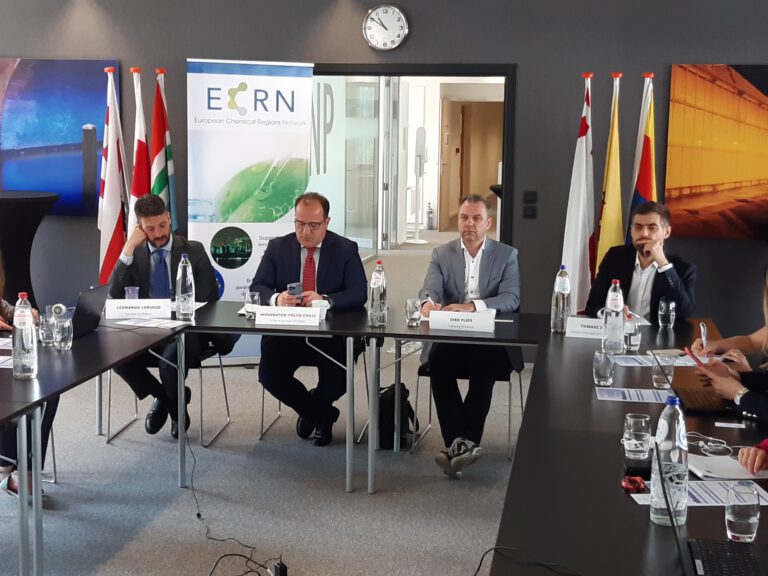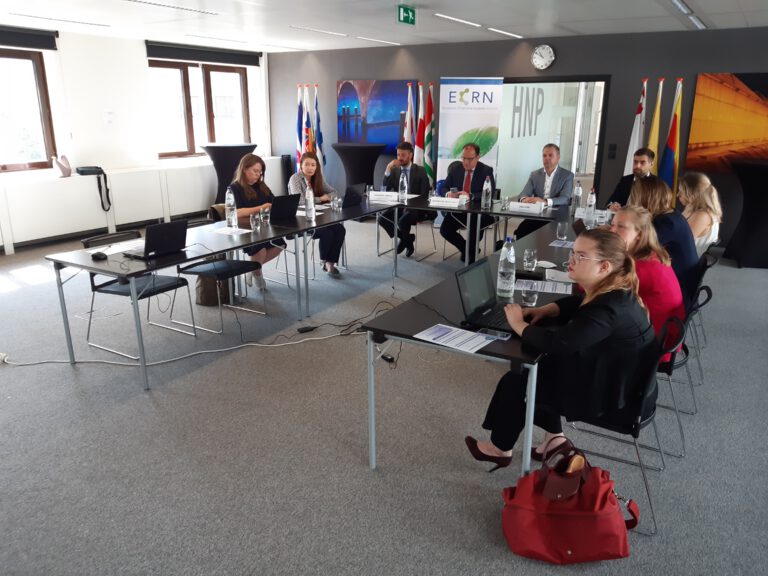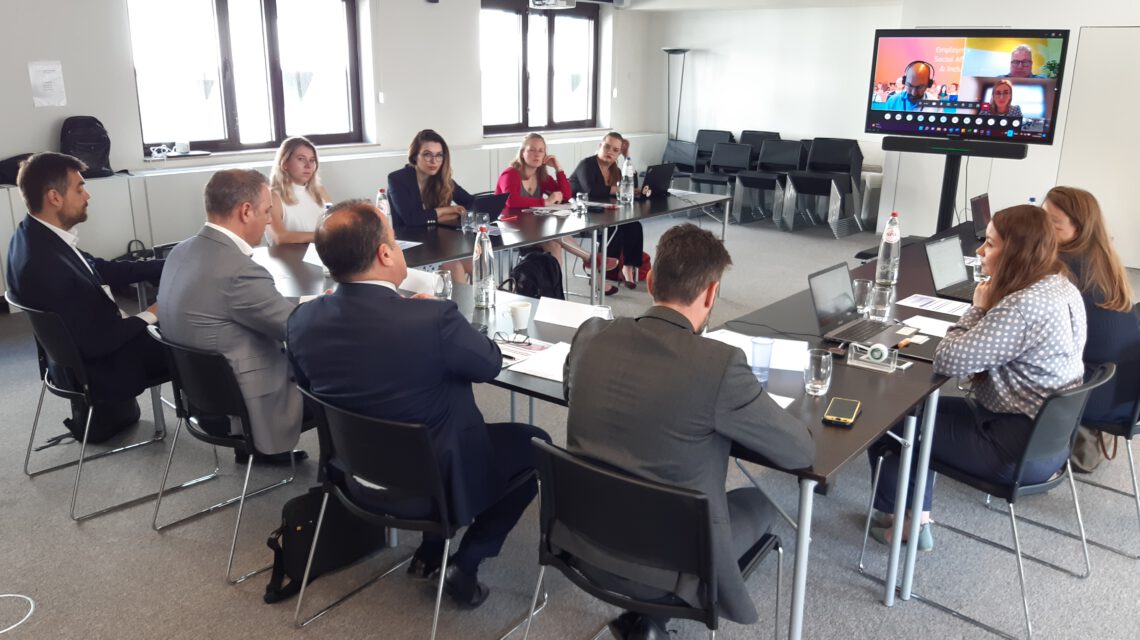On 17 May 2022, ECRN organised a hybrid event to discuss the role of skills and education in making the European chemical industry ready for the green and digital transitions, competitive at the global level, and resilient to market disruptions.
ECRN Executive Director, Mr. Folco Ciulli, moderated the discussion, which was articulated in two panels: 1. Shaping EU policies on skills, and 2. The role of regional stakeholders.
The opening remarks were delivered by Mr. Dirk Plees on behalf of Minister Stephan Satijn, Regional Minister for Economy, Land Management, and Education of the Province of Limburg Netherlands and vice-president of ECRN. In his speech, Mr. Plees highlighted the importance of the chemical sector for Limburg and brought the successful example of the Brightlands Chemelot Campus. Brightlands is the result of Limburg’s efforts to create a modern and innovative triple helix ecosystem that brings together large corporations, small and medium-sized companies, and research and education institutions. In particular, the campus is home to CHILL (Chemelot Innovation and Learning Labs), a learning and working community created as a collaboration between companies and knowledge institutes to ensure that highly trained professionals enter the chemical sector.

PANEL 1: Shaping EU policy
Mr. Miguel Fernandez (DG EMPL, European Commission) presented the Pact for Skills, launched in 2020 as one of the 12 actions foreseen to deliver the ambitious objectives of the European Skills Agenda. The aim of the Pact is to mobilise all relevant stakeholders (businesses, social partners, education and training providers, regional and local authorities, etc.), in order to boost upskilling and reskilling of people of working age. This will have not only positive social effects, but it is also essential for Europe to succeed in the twin transition.
The rationale behind the Pact is that building partnerships between different stakeholders will produce a greater impact on the ground, facilitate economies of scale, and increase our knowledge and comprehension of the challenges and possible solutions.
Although the Pact sets specific common goals, it is very flexible about how to achieve them and in the way stakeholders can cooperate. At EU level, the efforts are directed at building large scale partnerships, at least one per each of the 14 key ecosystems identified in the EU Industrial Strategy. The regional dimension is key, as stakeholders can build partnerships more easily at this level. Finally, the pact also welcome individual commitments by organisations like ECRN, which has recently been accepted among the signatories of the Pact.
Mr. Leonardo Lorusso (Italian Delegation at the Education Committee of the Council of the EU) brought the point of view on national governments working at the Council level. Since 2016, the skills gaps and mismatches have arisen a lot of attention among Member States because of their impact on the economy. At the same time, the green and digital transitions are making the skills gap even more apparent and require skilled workers to be successful.
The majority of adult learning is non-formal and work-related, often targeting the employees with the highest levels of education and performing the most complex jobs. It is also fragmented, partly because of the lack of coordination between different institutions. Finally, public funding dedicated to adult learning is often included in broader budgets (e.g. the European Social Fund) and targets low-skilled and unemployed people, failing to ensure lifelong learning for all adults of working age.
Against this background, in 2016 the Council published a recommendation on upskilling pathways, which introduces a three-stage framework on upskilling:
- skills assessment;
- provision of tailor-made and flexible programmes;
- validation and recognition.
Addressing skills gaps and mismatches requires a shift of mindset to make lifelong learning the norm and strong cooperation among all stakeholders and actors involved, including public authorities, education institutions, companies, and workers.
Ms. Eleonora Isopo (European Chemical Employers Group) presented ECEG and its activities, which include advocacy and lobbying (also in the framework of the Social Dialogue), participation in EU-funded projects and in stakeholders’ partnerships.
With regards to skills, ECEG has a working group dedicated to education and lifelong learning, which has become increasingly relevant especially considering the so-called quadruple transition that the chemical industry is facing to address:
- Climate neutrality
- Circularity
- Digitalisation
- Implementation of the Chemical Strategy for Sustainability
This quadruple transition will have a strong impact on the job profiles needed in the sector:
- Need to attract and secure skilled workers.
- Need for technical and advanced digital skills, cross-cutting competencies and soft skills.
- Need to understand what kind of skills will be needed in the future.
To address these challenges, it is vital to:
- Increase the attractiveness of the chemical sector.
- Modernize teaching methods and training programmes, strengthening cooperation between education providers and employers.
- Focus on SMEs.
- Join forces and build partnerships between stakeholders. In this sense, ECEG advocates for a central role of Social Partners within the framework of the Social Dialogue and it is part of several stakeholders’ partnerships, such as the Just Transition Platform Working Group on Chemicals and the Blueprint project for sectoral cooperation on skills (ECRN is also part of both initiatives).

PANEL 2: The role of regional stakeholders
Mr. Tomasz Zielinski (Polish Chamber of Chemical Industry – PIPC) gave an overview of the chemical sector in Poland and presented the key challenges in terms of needs for skilled workers. Polish companies look for employees with soft and cross-cutting skills, the ability to work in a team, and the willingness to undergo technical training, but are currently facing a shortage of skilled workers, which force them to significantly reduce the duration of the training process. One of the key issues has been the lack of attractiveness of the chemical sector, due to some misconceptions about the industry but also a general lack of knowledge of the sector and the job profiles needed.
Therefore, PIPC has been working on several projects together with universities and education providers in order to:
- promote the chemical industry;
- push for a more hands-on approach to education that better conveys what working in the chemical industry actually looks like;
- ensure that students acquire the skills needed by the industry.
Cristina Piccinelli (Fondazione Istituto Tecnico Superiore per le nuove tecnologie della vita) brought the point of view of education providers. ITS Nuove Tecnologie della Vita is an Italian education and vocational institute that is complementary to universities, as it provides more hands-on training in line with the hyper-specialisation required by companies.
Ms. Piccinelli stressed the importance of avoiding the regionalisation of education, that is having different national training courses and programmes. In a common market, EU countries must work on harmonising education and training and sharing ideas to improve their programmes based on the needs of the industry.
Lastly, Mr. Ron Lambi (Brightlands Chemelot Campus) presented the success story of the Chemelot Innovation & Learning Labs (CHILL). Founded 10 years ago by some large chemical companies and different educational and vocational institutions based at Brightlands Chemelot Campus, CHILL is a public-private organisation that makes a real connection between education and businesses. The goal is to deliver more and better educated students.
There are three key elements behind the success of CHILL:
- Innovative surroundings: CHILL modern facilities are located at Brightlands Chemelot Campus, therefore they are part of a large ecosystem of companies, education, and research institutions.
- Community for development (CfD): training is based on the so-called CfD, which brings together a student, a coach, and an experience professional, working on an assignment (duration up to 20 weeks). The whole process is assessed to ensure the learning objectives are actually achieved.
- Innovative and hands-on approach: students learn on real life cases provided by companies, which is beneficial for both students and companies. Accordingly, the process is result-driven institution more than obligation-driven (like traditional educational centres).



